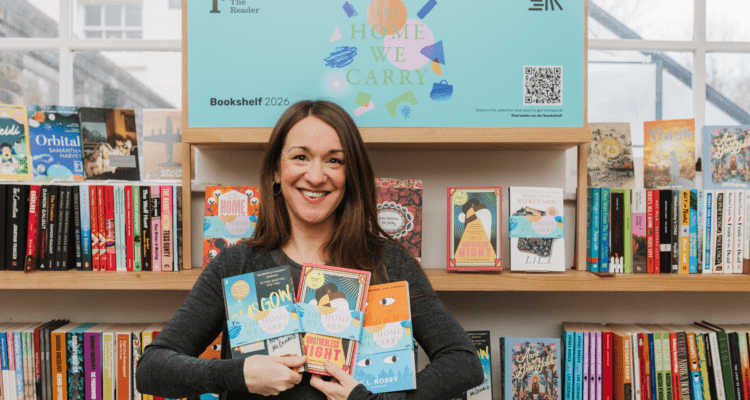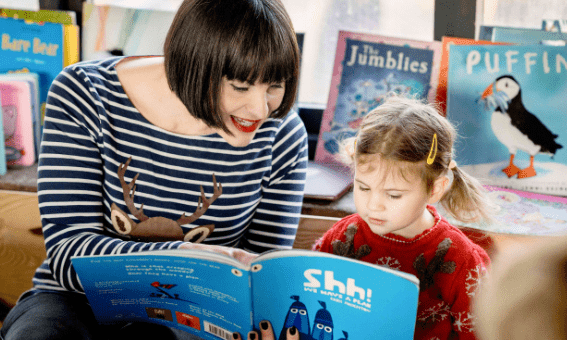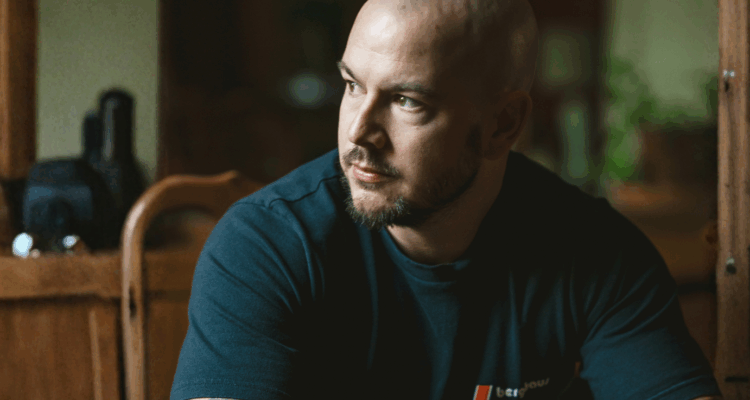Rise in free ESOL Shared Reading groups at The Reader
Tough new government language requirements for migrants seeking permanent residency in the UK come into effect from January 2026. A sharp rise in demand is expected for already oversubscribed (English for Speakers of Other Languages) ESOL courses after years of funding cuts. Over the last six years The Reader has adapted its innovative Shared Reading model to offer an increasing number of free ESOL focused groups to help support connection and wellbeing - with highly successful results.

‘You can learn all the words, but if you don't have that connection with another human to be able to put them to use, it feels very lonely and isolating’
- Katie Clark, Director of Literature, The Reader
A charity’s Director of Literature has outlined how poetry and stories can successfully help refugees and asylum seekers build confidence, connect with each other and their local community when learning English.
The Reader, the UK’s largest Shared Reading charity, currently runs 12 groups with a specific focus on English for Speakers of Other Languages (ESOL) in the North West, South Yorkshire, Midlands, London and South West – with a new group set to launch at Bootle Library in Liverpool by 2026. It also has eight community groups, open to all, with ESOL members attending.
Each week a group leader selects stories and poems to read aloud, and everyone is welcome to share how the words make them feel, their thoughts and memories. There is no pressure to talk or read aloud.
Katie Clark, the charity’s Director of Literature, works in collaboration with Our Liverpool, a Liverpool City Council funded project running ‘stop-gap’ education classes for children from sanctuary seeking families awaiting a school place. She is group leader of a weekly ESOL Shared Reading group for their parents and guardians.
Katie Clark said: “I always say, 'I'm not an English teacher' but I use Shared Reading to help me think about the words and language and that can help with English learning. Often people who are learning English are doing it alone, using their phones or YouTube. You can see the joy in people's faces when they have that connection with another human, and the difference that makes.
“You can learn all the words, but if you don't have that connection with another human to be able to put them to use, it feels very lonely and isolating. That's why I think the big need the group is addressing is connection and confidence, which is such a huge part of learning a language.”
Members of the group include a Kurdish asylum-seeker from Iran who fled death threats.
She said: “I have three children aged six, 11 and 14 who go to school at Our Liverpool, and joined The Reader’s Shared Reading group. When Katie (Clark, the group leader) reads her poems I look up the Persian meaning on my phone using Google Translate and learn new English words which makes me very happy. The people at The Reader are very kind and I really like to learn English as I will be more in touch with people.”
Ninety-three per cent of ESOL group members who took part in The Reader’s 2024 survey evaluation agreed that Shared Reading lifted their mood, 89% said hearing other people’s thoughts gave them a new way of seeing things and 78% said Shared Reading helped them to connect with others in a deeper way. They were also more likely to say they felt it had a positive impact on their lives outside the group with 59% saying they felt more confident.
THREE READER STORIES
Over the last month group leaders and other members have described how ESOL Shared Reading has made a huge difference to their lives from providing a friendly, welcoming and sociable safe space to boosting confidence, making new friendships and accelerating English learning.
Kelly (China)
Mother-of-two Kelly, who moved to Liverpool from China in 2010, has been attending a Shared Reading group at Halewood Library, Knowsley, since May 2023 when her children were settled at school.
She said: “I felt instantly welcomed by the Reader Leader and rest of the group. They were reading George Eliot’s 500-page book Adam Bede and I thought: ‘No, I can’t do that, my English isn’t good enough’.
“Our Reader Leader handed me a copy of the book and summarised what was happening. Before I knew it, I was immersed into the story and characters - and couldn’t believe how I could understand it. I didn’t understand all of the English words but with the group discussion about what is happening, it all fell into place for me. The group were so helpful and kind and it has become a routine for me every week.
“I am very surprised that I have learnt so much about British culture from what we read and also from the other group members and I am grateful for this. The Chapters in Adam Bede are numbered in Roman numerals, and this is new for me. The group has helped me to translate them, and I love to tell the time on the clocks around the town. The language barrier is getting smaller all the time.”
Nataliia (Ukraine)
When Russia invaded her home city of Polohy in Ukraine three years ago, refugee Nataliia relocated to the Lancashire town of Skelmersdale where she joined one of The Reader’s biggest ESOL Shared Reading groups, set up six years ago by a retired teacher.
She now works for Refugee Women Connect in Liverpool as an outreach worker with new mums and trained as a Reader Leader to help co-lead an ESOL Shared Reading group.
Nataliia said: “For me the Shared Reading group was always my safe place where you are always welcome. Everyone really cares about you and supports you. It’s where I started to feel able to speak more confidently in English. When I moved to the UK I was too shy to speak as did not want to make any mistakes.
“Some members of the group were from Iran, Iraq, Ethiopia, Egypt, Kurdistan, Sudan and other countries and many could not speak much English in the beginning. It was really nice you could see their progress week by week – putting all these English words in a sentence, it was so incredible. It really helped everyone.
“They’ve become like family to me. I never missed a single week. Although we are all from different places, we have so many similarities and shared our thoughts with each other and discussed things happening in our own lives. We all really connected through the poems.”
Douglas (Borderlands’ Learning Project Manager)
At Borderlands, a Bristol-based charity supporting refugees and asylum seekers, a poetry Shared Reading group is run as part of their ESOL programme. It is led by two volunteers trained by The Reader.
Douglas, Learning Project Manager at Borderlands, said: “The other week we read a poem about friendship, and by chance there were two women in the group who had only recently met in the hotel and become friends – the poem resonated with them and they got really involved in the session.
“A lot of our students only ever talk to people in positions of power; they're being questioned a lot; the dynamics in most of their interactions are skewed against them. But in the Shared Reading group, everyone is equal, exploring the poems together. They're listened to in the group, and they can try new English words, it doesn’t matter if they don’t use the words in exactly the right way. The group offers the chance to engage on their own terms with the language in a really safe space.
“Sometimes it's through the poetry that we find the passion that people have for other things. For instance, there was a girl in the group a few weeks ago, and during the discussion of the poem she mentioned she loves football and that was what she really missed from her home. By the end of the session, we'd contacted a local team and they’d given her a place.”
The charity offers a range of wide range support sessions for ESOL group leaders from courses on Addressing Race and Racism in Shared Reading to a monthly online Shared reading group with upcoming sessions focusing on specific texts or extracts such as Coal by Audre Lorde Go Tell it on the Mountain by James Baldwin, Where the Scattering Began by Merle Collins and The Third Life of Grange Copeland by Alice Walker.
The Reader currently runs 20 Shared Reading groups with an ESOL focus for speakers of other languages across the UK. If you or someone you know would benefit from an ESOL Shared Reading group please visit our Find a Group page here. To find out more about The Reader’s Shared Reading in Communities visit here or if you would like to partner with us visit here.
Share
Related Articles

The Reader unveils new Bookshelf for 2026
The UK’s biggest Shared Reading charity today launches its 6th annual Reader Bookshelf - a carefully curated collection of stories, plays, and poems - at the start of the…

The Reader launches Christmas appeal to raise £10,000 to help care-experienced children thrive through the joy of reading
As the festive season approaches, the Liverpool-based national Shared Reading charity is launching an appeal calling for help to make…

Meet Anton Clarke, Director of Social Enterprises
‘The Reader has made a meaningful difference to the lives of many people’ Director of Social Enterprises Anton Clarke looks…


